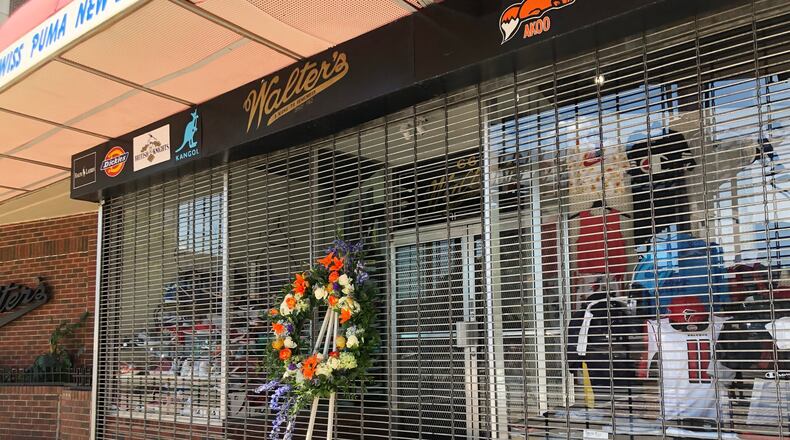Walter Strauss fled Nazi Germany when he was 13, with few possessions and no money.
By his 30s, though, Strauss was on his way to building an Atlanta institution.
People traveled from around the nation to shop at Walter’s Clothing for sneakers and more. The store’s Facebook page includes messages from South Carolina, Alabama, and as far away as Australia.
“He treated everyone equally,” said a daughter, Michelle Schwartz, who lives in Jefferson, Ga. “He was not anti-anything. Everyone was a human being and deserved to be treated with dignity and respect.”
Strauss died Wednesday at 94. His family said he suffered from Parkinson’s disease and dementia.
Services were held Thursday. Arrangements were handled by Dressler’s Jewish Funeral Care.
RELATED: Social media reaction to the death of Walter's Clothing founder
Walter’s Clothing, with its familiar red and white awning, is part of the bustling downtown landscape. Situated on the corner of Decatur Street and Central Avenue, it is surrounded by Georgia State University and towering office buildings, and within a stone’s throw of Underground Atlanta.
Customers include politicians, professional athletes, restaurant workers, delivery drivers and celebrities such as Rick Ross, Big Boi, Ludacris and DJ Khaled. Once, author and political activist Cornell West came in with his family, an employee said.
“My Dad took me there to get the leather Converse AllStars when I was a kid,” tweeted former Atlanta Mayor Kasim Reed. “Going there was like a rite of passage for fathers and sons.”
Schwartz said her father treated employees like family, which is why so many worked there for decades.
He and his wife of 64 years, Estelle, started a jobs training program for high school students.
“He only required them to be honest and be on time,” said Estelle Strauss. “We would never fire a person. Walter always said, ‘Let’s give them a second chance,’ and it would straighten them out.”
Longtime employee and friend Larry Hammonds considered him a father figure.
“He was demanding and stayed on you, but all the time he was pushing you to the limit — to be the best that you could be,” said Hammonds, who started working for Strauss five decades ago. “He was real firm, but you knew he cared about your welfare.”
Customer Marshall Scott said he preferred going to “Mr. Walter” instead of malls. He first went to Walter’s Clothing with an uncle when he was 9, and he continued to shop there as an adult.
“He was always straight up,” said Scott, a barber. “He would work with you. I like dealing with people one on one. He was the owner, but more like a friend.”
Radio personality Greg Street took to Instagram to leave condolences:
“We’re Gonna Miss You Big Guy. Walt #WaltersClothing Lives On. 66 Decatur St SE & Central Ave Sw. #RIPWalt #RIPWalters #RIP To The Founder Of Walter’s Clothing. The City Gonna Keep You Alive Big Homie.”
“If you’re from Atlanta and you haven’t bought any shoes from here, then you don’t know what you’re doing,” said Shaun Burke, who has worked at the store for 23 years. “There are shoes in colors that you will never see in a typical store, like a Foot Locker or Champs (Sports).”
Jeff Steinbook, president of the business and Strauss’ former son-in-law, was close to him.
“He always treated people with respect,” he said. “That’s the cornerstone of who he was.”
Strauss was born in Alsfeld, Germany, and made it to the United States with assistance from several Jewish families who helped German Jews escape. His parents and a brother eventually reached Zambia. But his sister, Hana Lore, was unable to leave and died in a German concentration camp in Nazi-occupied Poland.
While Strauss was heartbroken, “he was a very stoic and strong personality,” said Schwartz.
Strauss attended high school in Atlanta and later joined the U.S. Army, where he served as a translator. He left the Army to go into business for himself.
In 1952, Strauss opened his first store, not far from the current location, selling work clothes and overalls. Later, he branched out into what the store would become known for — shelves and shelves of sneakers in every style and color.
When he started the business, many retailers would not let African-American customers try on clothes, said Steinbook.
Strauss abhorred that policy and made sure anyone — black or white — could try on clothes at his store. Sometimes, he would give customers free socks.
He usually worked six days a week. His loved ones said the most important things to him were his family, his business and his employees.
He also had a fondness for the Atlanta Falcons. “They were his team, no matter what,” said Schwartz.
And when Strauss spoke, people listened because they knew “it was coming from a place of wisdom and love. Never a place of judgment,” said Schwartz. “It was amazing to watch him, really.”
Survivors include his wife, Estelle, of Atlanta; daughters Michelle Schwartz of Jefferson; and Sandra Steinbook; two grandchildren, Brandon and Mitchell Steinbook; and his brother Henry Strauss. He also has numerous nieces and nephews.
In lieu of flowers, the family asks that donations be made to any charity that “supports community and justice.”
About the Author
The Latest
Featured




